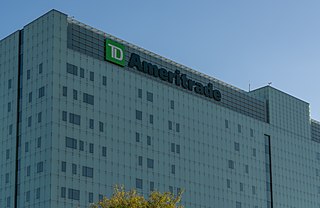Related Research Articles

A capital market is a financial market in which long-term debt or equity-backed securities are bought and sold, in contrast to a money market where short-term debt is bought and sold. Capital markets channel the wealth of savers to those who can put it to long-term productive use, such as companies or governments making long-term investments. Financial regulators like Securities and Exchange Board of India (SEBI), Bank of England (BoE) and the U.S. Securities and Exchange Commission (SEC) oversee capital markets to protect investors against fraud, among other duties.

In financial accounting, a balance sheet is a summary of the financial balances of an individual or organization, whether it be a sole proprietorship, a business partnership, a corporation, private limited company or other organization such as government or not-for-profit entity. Assets, liabilities and ownership equity are listed as of a specific date, such as the end of its financial year. A balance sheet is often described as a "snapshot of a company's financial condition". Of the four basic financial statements, the balance sheet is the only statement which applies to a single point in time of a business's calendar year.
Investment banking pertains to certain activities of a financial services company or a corporate division that consist in advisory-based financial transactions on behalf of individuals, corporations, and governments. Traditionally associated with corporate finance, such a bank might assist in raising financial capital by underwriting or acting as the client's agent in the issuance of debt or equity securities. An investment bank may also assist companies involved in mergers and acquisitions (M&A) and provide ancillary services such as market making, trading of derivatives and equity securities, FICC services or research. Most investment banks maintain prime brokerage and asset management departments in conjunction with their investment research businesses. As an industry, it is broken up into the Bulge Bracket, Middle Market, and boutique market.

The money market is a component of the economy that provides short-term funds. The money market deals in short-term loans, generally for a period of a year or less.

Financial services are the economic services provided by the finance industry, which encompasses a broad range of businesses that manage money, including credit unions, banks, credit-card companies, insurance companies, accountancy companies, consumer-finance companies, stock brokerages, investment funds, individual asset managers, and some government-sponsored enterprises.
A transaction account, also called a checking account, chequing account, current account, demand deposit account, or share draft account at credit unions, is a deposit account held at a bank or other financial institution. It is available to the account owner "on demand" and is available for frequent and immediate access by the account owner or to others as the account owner may direct. Access may be in a variety of ways, such as cash withdrawals, use of debit cards, cheques (checks) and electronic transfer. In economic terms, the funds held in a transaction account are regarded as liquid funds. In accounting terms, they are considered as cash.

In the United States, the federal funds rate is the interest rate at which depository institutions lend reserve balances to other depository institutions overnight on an uncollateralized basis. Reserve balances are amounts held at the Federal Reserve to maintain depository institutions' reserve requirements. Institutions with surplus balances in their accounts lend those balances to institutions in need of larger balances. The federal funds rate is an important benchmark in financial markets.
A money market fund is an open-ended mutual fund that invests in short-term debt securities such as US Treasury bills and commercial paper. Money market funds are managed with the goal of maintaining a highly stable asset value through liquid investments, while paying income to investors in the form of dividends. Although they are not insured against loss, actual losses have been quite rare in practice.
The discount window is an instrument of monetary policy that allows eligible institutions to borrow money from the central bank, usually on a short-term basis, to meet temporary shortages of liquidity caused by internal or external disruptions. The term originated with the practice of sending a bank representative to a reserve bank teller window when a bank needed to borrow money.
A custodian bank, or simply custodian, is a specialized financial institution responsible for providing securities services. It safeguards assets of asset managers, insurance companies, hedge funds, and is not engaged in "traditional" commercial or consumer/retail banking like lending. The role of a custodian in such a case would be to:
Cash management refers to a broad area of finance involving the collection, handling, and usage of cash. It involves assessing market liquidity, cash flow, and investments.

An auction rate security (ARS) typically refers to a debt instrument with a long-term nominal maturity for which the interest rate is regularly reset through a Dutch auction. Since February 2008, most such auctions have failed, and the auction market has been largely frozen. In late 2008, investment banks that had marketed and distributed auction rate securities agreed to repurchase most of them at par.

A line of credit is a credit facility extended by a bank or other financial institution to a government, business or individual customer that enables the customer to draw on the facility when the customer needs funds. A line of credit takes several forms, such as an overdraft limit, demand loan, special purpose, export packing credit, term loan, discounting, purchase of commercial bills, traditional revolving credit card account, etc. It is effectively a source of funds that can readily be tapped at the borrower's discretion. Interest is paid only on money actually withdrawn. Lines of credit can be secured by collateral, or may be unsecured.

TD Ameritrade is a stockbroker that offers an electronic trading platform for the trade of financial assets including common stocks, preferred stocks, futures contracts, exchange-traded funds, forex, options, mutual funds, fixed income investments, margin lending, and cash management services. The company receives revenue from interest income on margin balances, commissions for order execution, and payment for order flow.
A sweep account is an account set up at a bank or other financial institution where the funds are automatically managed between a primary cash account and secondary investment accounts.
Asset and liability management is the practice of managing financial risks that arise due to mismatches between the assets and liabilities as part of an investment strategy in financial accounting.

Check kiting or cheque kiting is a form of check fraud, involving taking advantage of the float to make use of non-existent funds in a checking or other bank account. In this way, instead of being used as a negotiable instrument, checks are misused as a form of unauthorized credit.

A bank is a financial institution that accepts deposits from the public and creates a demand deposit while simultaneously making loans. Lending activities can be directly performed by the bank or indirectly through capital markets.
A stable value fund is a type of investment available in 401(k) plans and other defined contribution plans as well as some 529 or tuition assistance plans. Stable value funds are often made available in these plans under a name that intends to describe the nature of the fund. They offer principal preservation, predictable returns, and a rate higher than similar options without proportionately increasing risk. The funds are structured in various ways, but in general they are composed of high quality, diversified fixed income portfolios that are protected against interest rate volatility by contracts from banks and insurance companies. For example, a stable value fund may hold highly rated government or corporate debt, asset-backed securities, residential and commercial mortgage-backed securities, and cash equivalents. Stable value funds are designed to preserve principal while providing steady, positive returns, and are considered one of the lowest risk investment options offered in 401(k) plans. Stable value funds have recently been returning an annualized average of 2.72% as of October 2014, higher than the 0.08% offered by money-market funds, and are offered in 165,000 retirement plans.

Wealthfront Inc. is an automated investment service firm based in Palo Alto, California, founded by Andy Rachleff and Dan Carroll in 2008. As of September 2019, Wealthfront had $21 billion AUM across 400,000 accounts.
References
- ↑ "Sweep Accounts Definition: Types and How They Work". Investopedia. Retrieved 2018-09-16.
- ↑ "Citibank". Citigroup. January 1, 2006. Retrieved 2007-03-08.
- ↑ "Cash Management Services". Pacific Western Bank. January 1, 2007. Retrieved 2007-03-08.
- ↑ "Sweep Investment Account". Guaranty Bank. January 1, 2007. Retrieved 2007-03-08.